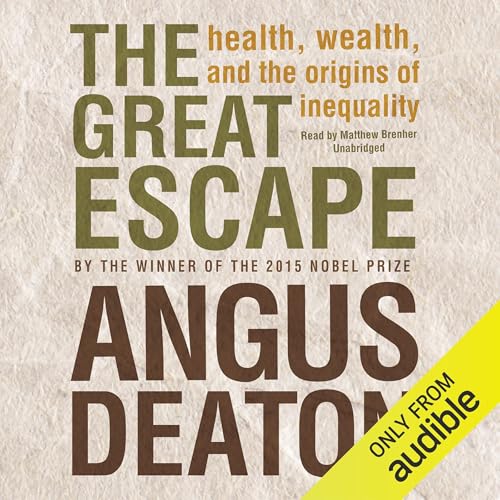
The Great Escape
Health, Wealth, and the Origins of Inequality
Failed to add items
Add to basket failed.
Add to wishlist failed.
Remove from wishlist failed.
Adding to library failed
Follow podcast failed
Unfollow podcast failed
Audible Standard 30-day free trial
Buy Now for £15.40
-
Narrated by:
-
Matthew Brenher
-
By:
-
Angus Deaton
About this listen
The world is a better place than it used to be. People are healthier, wealthier, and live longer. Yet the escapes from destitution by so many has left gaping inequalities between people and nations.
In The Great Escape, Angus Deaton - one of the foremost experts on economic development and on poverty - tells the remarkable story of how, beginning 250 years ago, some parts of the world experienced sustained progress, opening up gaps and setting the stage for today's disproportionately unequal world. Deaton takes an in-depth look at the historical and ongoing patterns behind the health and wealth of nations and addresses what needs to be done to help those left behind.
Deaton describes vast innovations and wrenching setbacks: the successes of antibiotics, pest control, vaccinations, and clean water on one hand and disastrous famines and the HIV/AIDS epidemic on the other. He examines the United States, a nation that has prospered but is today experiencing slower growth and increasing inequality. He also considers how economic growth in India and China has improved the lives of more than a billion people. Deaton argues that international aid has been ineffective and even harmful. He suggests alternative efforts - including reforming incentives to drug companies and lifting trade restrictions - that will allow the developing world to bring about its own great escape.
Demonstrating how changes in health and living standards have transformed our lives, The Great Escape is a powerful guide to addressing the well-being of all nations.
PLEASE NOTE: When you purchase this title, the accompanying PDF will be available in your Audible Library along with the audio.
©2016 Angus Deaton (P)2016 Blackstone AudioVery Interesting
Something went wrong. Please try again in a few minutes.
Among its highlights, the book offers a strident critique of foreign aid and technocratic management from an institutional point of view.
The audiobook suffers from the presence of many graphs, which must be read separately.
An informative synopsis of growth
Something went wrong. Please try again in a few minutes.
extremely informative, immensely thought provoking
Something went wrong. Please try again in a few minutes.
a bit slow
Something went wrong. Please try again in a few minutes.
Missing charts
Something went wrong. Please try again in a few minutes.


